Watch CBS News
Be the first to know
Get browser notifications for breaking news, live events, and exclusive reporting.
Watch CBS News
Best-selling author and dating coach Matthew Hussey, known for his popular podcast “Love Life with Matthew Hussey” and his popular YouTube videos, unveils his new book, “Love Life: How to Raise Your Standards, Find Your Person, and Live Happily — No Matter What.”
Be the first to know
Get browser notifications for breaking news, live events, and exclusive reporting.
Trump Media & Technology Group on Tuesday announced plans to start a streaming TV platform to air news, film and other content the company claims other media outlets refuse to show.
The announcement comes three weeks after Trump Media began trading on the Nasdaq stock market, briefly valuing the company at $10.8 billion. After reaching peaking at $79.38 per share on March 26, the stock — which trades under the ticker DJT, the initials of former President Donald Trump — has plunged by almost 70%.
The slide continued on Tuesday, with Trump Media shares slipping $3.29, or 12.4%, to $23.32 in early afternoon trading. Its market value now stands at about $3.1 billion.
Trump Media’s primary asset is Truth Social, the social media service that Trump created in 2022 after he was booted from major platforms following the January 6 assault on the U.S. Capitol. From its founding, the company aimed to create what it called a “media powerhouse” with multiple platforms, including social media and digital streaming. Until now, however, the company had only introduced Truth Social.
Going public has helped bolster the money-losing company’s coffers, with Trump Media CEO Devin Nunes telling Fox Business earlier this month that it has “$200 million in the bank” to fund its plans.
Key to building a major media company will be building an audience, which in turn could convince advertisers to open their wallets. Although Trump Media doesn’t disclose its user numbers, the service had an estimated 494,000 monthly active users in February, compared with 142 million for Facebook and 75 million for X (formerly known as Twitter), according to web data company Similarweb.
That may explain why Trump Media’s revenue last year was $4.1 million, or about half the annual sales booked by an average single Chick-fil-A locationwhile it lost $58 million. Recent advertisers on Truth Social include groups like Patriots for America, a group hawking Trump hats, and USA Gear, selling American flag hoodies.
Trump Media didn’t immediately respond to a request for comment.
Trump Media said its streaming TV platform will first unveil on the Truth Social app before eventually making its way to home TV streaming. The company didn’t provide a timeline for the rollout.
“There is a lot of great content that simply can’t find an audience for unjust reasons, and we want to let these creators know they’ll soon have a guaranteed platform where they won’t be cancelled [sic],” Nunes, a former Republican congressman from California, said.
The company added that its TV content will include “news networks, religious channels, family-friendly content including films and documentaries; and other content that has been cancelled, is at risk of cancellation, or is being suppressed on other platforms and services.”
To be sure, conservative-leaning TV networks already exist, including One America News Network (OANN) and Christian Broadcast Network, which produces the 700 Club. And conservative commentator Tucker Carlson debuted his Tucker Carlson Network after parting ways with Fox News last year.
Meanwhile, one of Trump Media’s main assets — its publicly traded stock — is continuing to lose value. That’s noteworthy because one route for a publicly traded company to raise additional capital is through secondary stock sales. If its shares become less valuable, that can hinder its ability to raise money from the public market.
Trump Media’s stock plunged 18.4% on Monday after the company filed a regulatory document that opens the door for the potential sale of millions more shares. The document, called an S-1, relates to warrants held by investors that can be transformed into shares of stock, as well as shares held by company insiders.
The former president’s 57% stake in his media business was valued at $1.8 billion on Tuesday afternoon, a sharp decline from its $6.3 billion valuation at the stock’s peak.
Trump Media’s stock are at risk of falling further, Ben Emons, senior portfolio manager at NewEdge Wealth, said in an April 15 research note. The price of the warrants, which give their holders the right to buy the stock at a certain price, has plunged 43% from their March 26 peak and now indicate the share price could decline to $17.50, he said.
“There is plenty of opportunity for the DJT stock price to recover, but it likely goes down first,” Emons added.
Aimee Picchi is the associate managing editor for CBS MoneyWatch, where she covers business and personal finance. She previously worked at Bloomberg News and has written for national news outlets including USA Today and Consumer Reports.
Record heat, hurricanes, wildfires all have been making news in recent years. And while not everyone agrees events like these are the direct result of climate change, they do connect to peoples’ opinions about it: a big majority of Americans feel the U.S. needs to address climate change, with those who report experiencing extreme weather more likely to say we should do so right now.
Views on climate change have long been associated with partisanship, and they still are, but age is a factor, too. Younger Americans, including younger Republicans, are even more likely to say the U.S. needs to take steps to at least try to slow it.
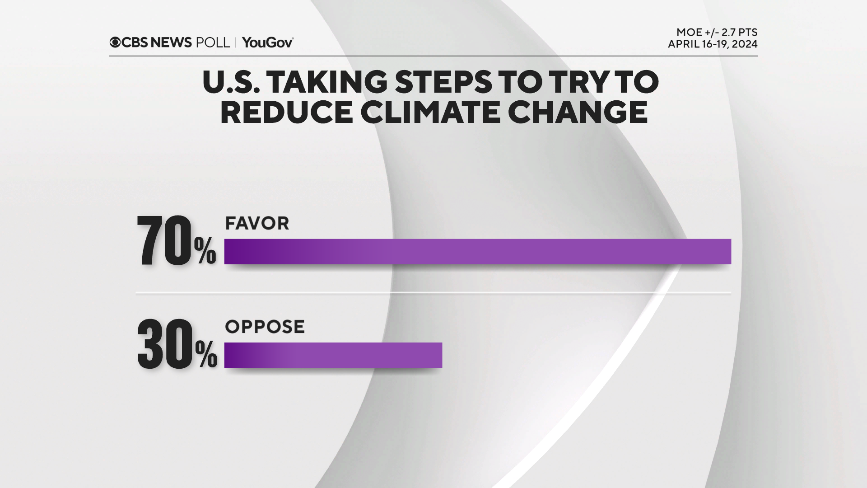
There’s a sense of urgency from many in the public, too. A large majority think it needs to be addressed at least in the next few years, including half who think it needs to be addressed right now.
There’s the sense that we should address climate change, and there’s also some belief that we can.
That extends down to the personal level, too. Most Americans believe humans can do something to at least slow the effects of climate change, and those who think so feel they personally have a responsibility to do something about it.
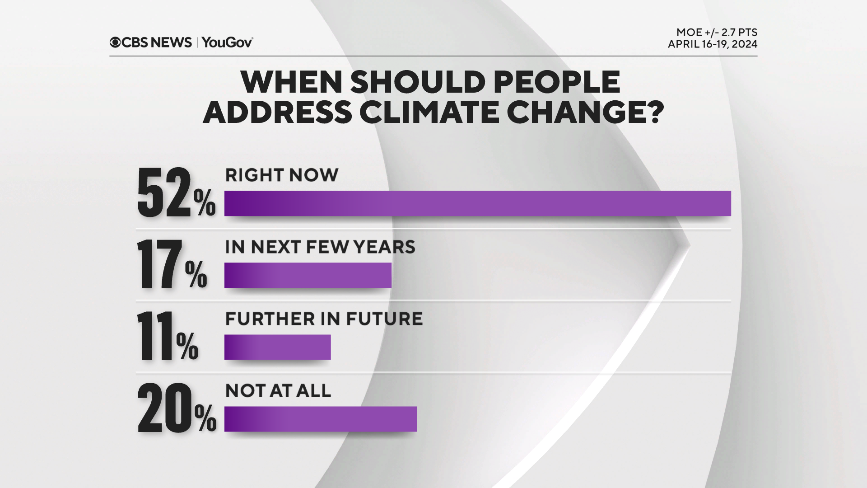
People who report having experienced extreme weather in their area in recent years — which is half the country — are more inclined than those who haven’t to believe climate change is a major factor contributing to extreme weather, and more of them see the issue as one that needs to be addressed right away.
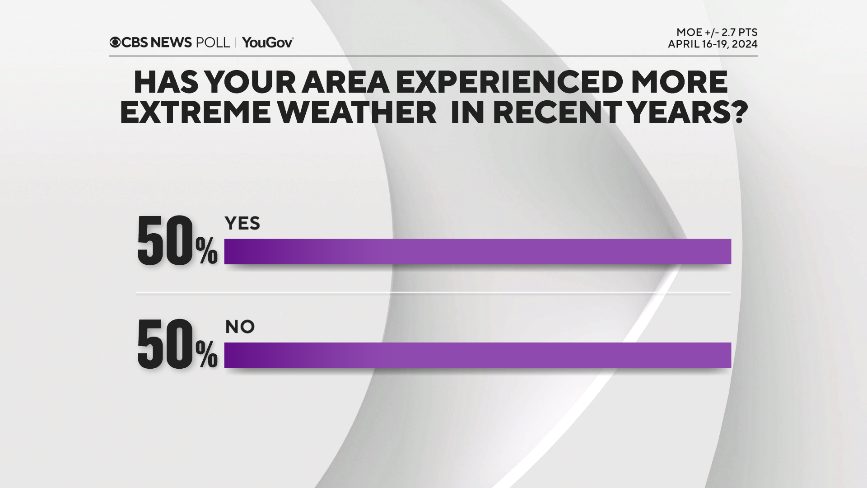
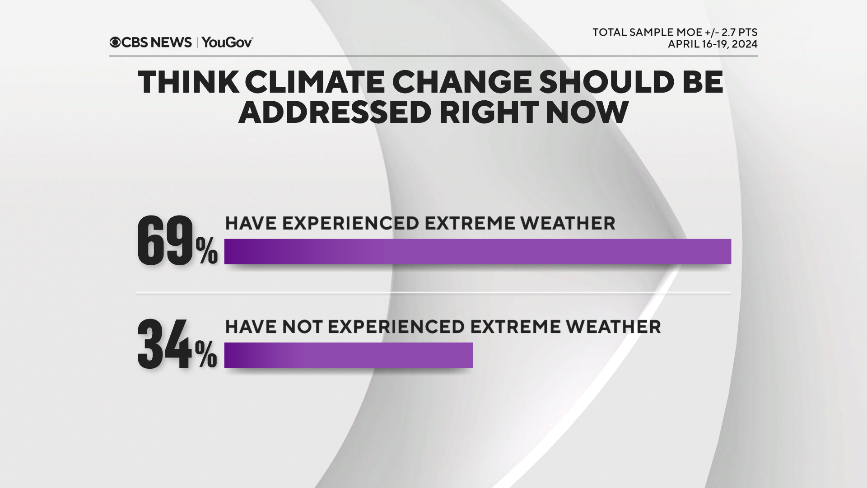
And even if people don’t experience the extreme weather themselves, such events can spark concern. When people hear about the earth experiencing the warmest temperatures on record, more than half say it makes them more concerned about climate change. Those who don’t see climate change as a factor in extreme weather are less persuaded by this, including some who don’t believe that the earth’s temperature is rising.
Majorities across all age groups favor the U.S. taking steps to address climate change, but it’s people under age 45 — many who say they were taught about climate change in school — who are especially likely to be in support of the country taking action.
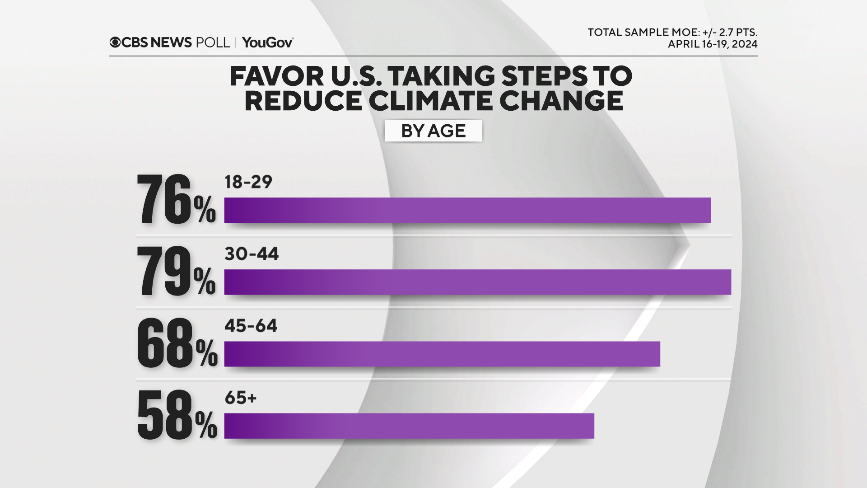
There have long been political divisions on addressing climate change, with Democrats expressing more concern than Republicans. These continue today, to some extent. Democrats are more than twice as likely as Republicans to say climate change needs to be addressed right now. And Democrats overwhelmingly support the U.S. taking steps to reduce climate change, but Republicans are divided on that.
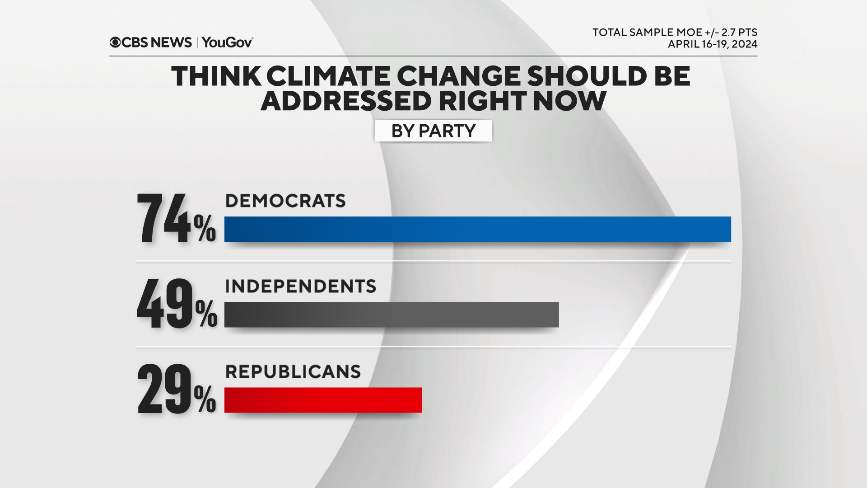
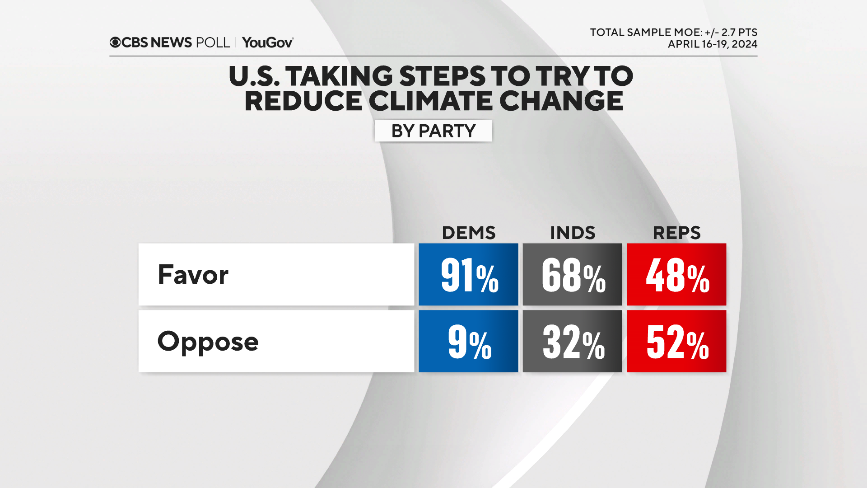
The divides within the rank and file GOP we see are along age and ideological lines. Most younger Republicans — those under age 45 — support the U.S. taking steps slow or stop climate change, while most older Republicans do not
More moderate Republicans also see climate change as more pressing than those who are more conservative.
And like the public overall, Republicans who report having experienced extreme weather in their local area are more likely to think climate change needs to be addressed.
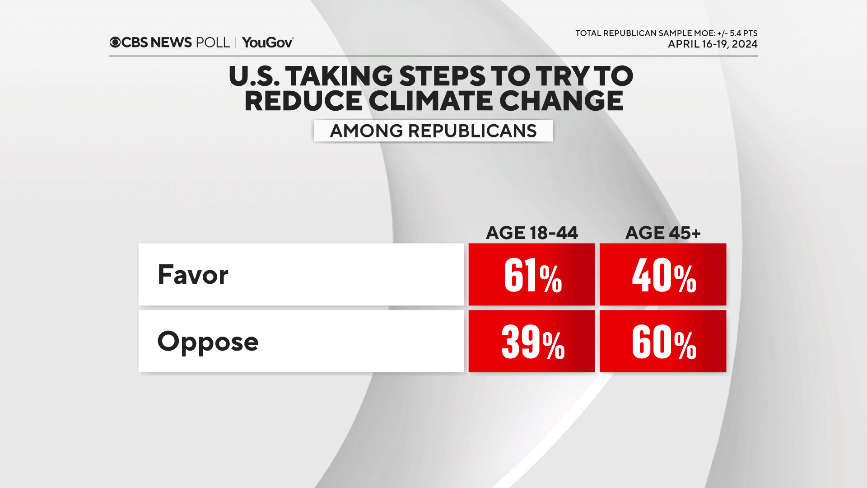
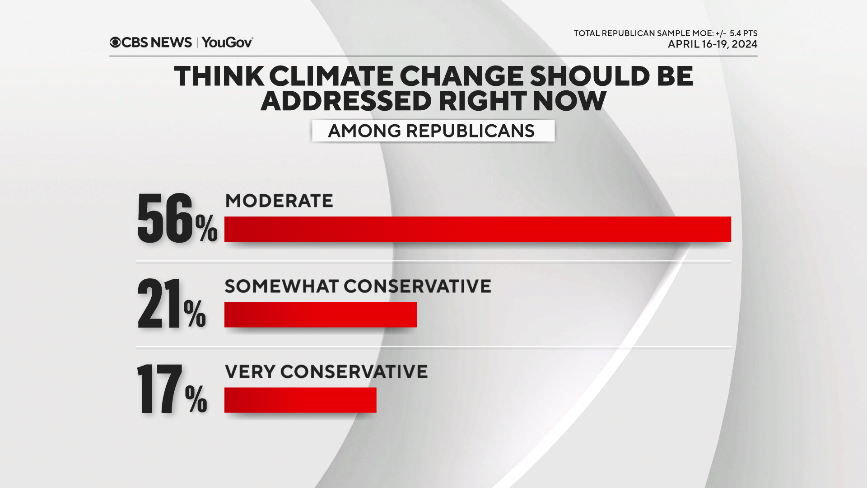
This CBS News/YouGov survey was conducted with a nationally representative sample of 2,230 U.S. adult residents interviewed between April 16-19, 2024. The sample was weighted according to gender, age, race, and education based on the U.S. Census American Community Survey and Current Population Survey, as well as past vote. The margin of error is ±2.7 points.
London — The British parliament passed a law late Monday that will mean asylum seekers arriving on British shores without prior permission can be sent to Rwanda and forbidden from ever returning to the U.K. The British government says the law will act as deterrent to anyone trying to enter the U.K. “illegally.”
The contentious program was voted through after the U.K.’s Supreme Court ruled it to be unlawfuland it has been condemned by human rights groups and the United Nations refugee agency.
King Charles III, who now must give the Rwanda bill his royal ascent to make it an official law, reportedly criticized the plan as “appalling” almost two years ago as it took shape.
Hours after the law was passed, French officials said at least five people drowned, including a child, in the English Channel during an attempt to make it to the U.K. on an overcrowded small boat.
The Rwanda plan was put together by Britain’s Conservative government in response to a number of migrant and asylum seeker arrivals on British shores in small boats from France.
With local asylum programs underfunded and overwhelmed, the government has been housing asylum seekers in hotels, where they are effectively trapped and unable to work until their claims are processed, which can take years. These hotels cost the government around 8 million pounds — almost $10 million in taxpayer money — every day to rent, according to CBS News partner BBC News.
Vuk Valcic/SOPA Images/LightRocket/Getty
Prime Minister Rishi Sunak’s government says the Rwanda policy will act as a deterrent to prevent migrants and asylum seekers from trying to reach the U.K. in the first place.
The new policy will give Britain’s immigration authorities power to send any asylum seeker entering the U.K. “illegally” after January 2022 to Rwanda. Those individuals can also be forbidden from ever applying for asylum in the U.K.
It will apply to anyone who arrives in the U.K. without prior permission — anyone who travels on a small boat or truck — even if their aim is to claim asylum and they have legitimate grounds to do so.
These people can, under the new law, be immediately sent to Rwanda, 4,000 miles away in East Africa, to have their asylum claim processed there. Under the law they could be granted refugee status in Rwanda and allowed to stay.
The law has been the subject of intense controversy and political wrangling.
In November 2023, the U.K. Supreme Court ruled the program was unlawful and violated the European Convention on Human Rights, because it said genuine refugees would be at risk of being deported back to their home countries, where they could face harm. The judgment also cited concerns with Rwanda’s human rights record.
The final legislation passed late Monday orders the court to ignore parts of the Human Rights Act and other U.K. and international rules, such as the Refugee Conventionthat would also block the deportations to Rwanda, the BBC reported.
Rights groups have said they will launch legal challenges against deporting people to Rwanda as quickly as possible. This could delay any removal flights.
Haley Ott is the CBS News Digital international reporter, based in the CBS News London bureau.
Watch CBS News
In the wake of a deadly shooting at Nashville’s Covenant School, Tennessee lawmakers have introduced a polarizing bill that would permit teachers to carry firearms in classrooms.
Be the first to know
Get browser notifications for breaking news, live events, and exclusive reporting.
Facing widespread unhappiness over its response to the Israel-Hamas warthe writers’ group PEN America has called off its annual awards ceremony. Dozens of nominees had dropped out of the event, which was to have taken place next week.
PEN, a literary and free expression organization, hands out hundreds of thousands of dollars in prizes each year, including $75,000 for the PEN/Jean Stein Award for best book. But with nine of the 10 Jean Stein finalists withdrawing, along with nominees in categories ranging from translation to poetry, continuing with the ceremony at The Town Hall in Manhattan proved unworkable.
Among those dropping out was debut novel finalist Rachel Eliza Griffiths, wife of former PEN president Salman Rushdie.
“This is a beloved event and an enormous amount of work goes into it, so we all regret this outcome but ultimately concluded it was not possible to carry out a celebration in the way we had hoped and planned,” PEN America CEO Suzanne Nossel said in a statement Monday.
The cancellation comes as tensions over the war have spread throughout the country, from college campuses to political events to roadways, which at times have been blocked by protesters everywhere from Illinois to California.
Since the war began last October, authors affiliated with PEN have repeatedly denounced the organization for allegedly favoring Israel and downplaying atrocities against Palestinian writers and journalists. In an open letter published last month, and endorsed by Naomi Klein and Lorrie Moore among others, the signers criticized PEN for not mobilizing “any substantial coordinated support” for Palestinians and for not upholding its mission to “dispel all hatreds and to champion the ideal of one humanity living in peace and equality in one world.”
PEN has responded by citing that it has condemned the loss of life in Gaza, called for a ceasefire and helped set up a $100,000 emergency fund for Palestinian writers. Last week, PEN America President Jennifer Finney Boylan announced that a committee was being formed to review the organization’s work, “not just over the last six months, but indeed, going back a decade, to ensure we are aligned with our mission and make recommendations about how we respond to future conflicts.”
Critics have said that the relief fund is too small and noted that PEN waited until March to endorse a ceasefire, five months after the war began.
Stein finalists had included Justin Torres’ “Blackouts,” winner last fall of the National Book Award for fiction, and Catherine Lacey’s “Biography of X.” At the request of the estate for Jean Stein, an author and oral historian who died in 2017, the prize money will be donated to the Palestine Children’s Relief Fund.
“Jean Stein was a passionate advocate for Palestinian rights who published, supported, and celebrated Palestinian writers and visual artists,” reads a statement from Katrina Vanden Heuvel, Wendy Vanden Heuvel and Bill Clegg, on behalf of the Stein estate. “While she established the PEN America award in her name to bring attention to and provide meaningful support to writers of the highest literary achievement, we know she would have respected the stance and sacrifice of the writers who have withdrawn from contention this year.”
Camille T. Dungy’s “Soil” had been the only remaining Stein award contender.
PEN announced Monday that judges had selected a handful of winners, among them Javier Fuentes’ “Countries of Origin” for debut novel, the PEN/Hemingway award. Playwright/screenwriter Tony Kushner will still receive the PEN/Mike Nichols Writing for Performance Award. Other honorary awards include the PEN/Nabokov Award for Achievement in International Literature, given to the late Maryse Condé.
Some authors have called for the resignation of Nossel and other top officials. Lacey, in an Instagram post last week, wrote that PEN needed to “make big changes in the leadership and move into a new era.” More than a dozen awards finalists endorsed a recent letter that demanded Nossel, Boylan and others step down and alleged that PEN had “shown blatant disregard of our collective values.”
A PEN spokesperson said it had no plans to respond to calls for Nossel and others to resign.
PEN’s other high-profile spring events — the “World Voices” festivals in New York and Los Angeles, and the gala at the American Museum of Natural History — will go ahead as scheduled. Klein and Moore are among the writers who have said they will not attend the World Voices festival, which Rushdie helped establish 20 years ago. Rushdie and other former PEN presidents, including Jennifer Egan and Andrew Solomon, had recently published a letter urging the literary community to participate in the festival.
“The festival was conceived amid conflict to draw together diverse authors and thinkers at a time of deepening and deadly geopolitical tension after 9/11,” the letter reads in part.
“We believe in PEN America and the festival and urge that, even at a time of discord, readers and writers will once again find a way to come together to jointly quest for insight and inspiration.”
Washington — Sen. Maria Cantwell, a key senator who has held up legislation regulating TikTok endorsed the House’s latest version of a measure that could lead to a ban of the social media app in the U.S.
Cantwell, a Democrat from Washington, announced her support late Wednesday for an updated measure that would force TikTok’s Chinese parent company to divest of the widely popular short-form video platform within one year.
The legislation is included in House Speaker Mike Johnson’s four-part foreign aid planwhich also involves wartime assistance for Ukraine and Israel. The updated version extends the six-month window ByteDance would have to sell its stake in the company or lose access to app stores and web-hosting services in the U.S. to nine months, with the possibility of a three-month extension.
Cantwell, who chairs the Senate Commerce Committee, opposed the original version of the Protecting Americans from Foreign Adversary Controlled Applications Act, which sailed through the House in March with bipartisan support but has faced headwinds in the slower-moving Senate over a number of concerns. Modifying the divestment deadline alleviated at least one of those issues.
“I’m very happy that Speaker Johnson and House leaders incorporated my recommendation to extend the ByteDance divestment period from six months to a year,” Cantwell said in a statement. “As I’ve said, extending the divestment period is necessary to ensure there is enough time for a new buyer to get a deal done. I support the updated legislation.”
A spokesperson for Cantwell did not immediately respond to a request for comment about whether the senator’s other concerns have been addressed in the updated bill, including whether it could survive legal scrutiny.
Cantwell told reporters Thursday afternoon she didn’t believe any other changes were made to the legislation, but there could be more in the future.
“We could look at things down the road, but for now, we support what they’re doing,” she said.
Support from Cantwell clears one hurdle that other TikTok-related measures have failed to overcome. But some lawmakers have questioned the bill’s constitutionality, making it likely other issues could emerge.
The updated bill included in the plan unveiled by Johnson, a Louisiana Republican, earlier this week pairs the forced TikTok divestment with new sanctions on Iran, China and Russia. The three remaining bills would provide $26 billion to support Israel, $61 billion to bolster Ukraine and $8 billion to counter China in the Indo-Pacific.
Alan He contributed reporting.
Caitlin Yilek is a politics reporter at cbsnews.com and is based in Washington, D.C. She previously worked for the Washington Examiner and The Hill, and was a member of the 2022 Paul Miller Washington Reporting Fellowship with the National Press Foundation.
Dr. Islam Abu-Zaher was working the night shift at Arab Medical Centre in the West Bank when he heard knocking on the door. “Doctor, doctor, we need help!”
Israeli soldiers had arrested several people, he was told, and one of them had died. He grabbed his emergency bag and rushed to the scene, where he found a familiar patient: 78-year-old Omar Assad, whom he had treated for cardiac problems in the past.
Dr. Abu-Zaher said he found the elderly man face down on the ground, bound and blindfolded, showing no signs of life. After multiple attempts to resuscitate Assad, the doctor pronounced him dead.
Assad had been arrested at a military checkpoint that night in January 2022 by members of the Israel Defence Forces’ Netzah Yehuda Battalion. An IDF investigation of the incident said that soldiers had tied Assad’s hands because he “refused to cooperate.”
“He’s an old man,” said Dr. Abu-Zaher. “He’s obese. He can’t walk properly. He has a lot of medical problems. He didn’t make any kind of risk for soldiers.”
Mahmdou Abu Eboud was arrested shortly after Assad, and says he saw IDF soldiers check the man’s pulse before abandoning him on the ground and leaving the scene. According to the Israeli military’s investigation, soldiers released Assad from all constraints and did not identify any signs of distress or ill health, explaining “the soldiers assessed that Assad was asleep and did not try to wake him.”
After the soldiers left, Abu Eboud sent for the doctor.
“The man was sick, he’d had open heart surgery. On top of all this it was zero or below zero that night,” Abu Eboud explained. “If you put a [78]-year-old man in this position … with all these health issues, and handcuffed, laying on his chest and it’s cold, what would happen?”
Assad was an American citizen. The U.S. State Department issued a statement at the time saying it was “deeply concerned” by the incident. And it is not the only instance where members of the battalion have faced accusations about their conduct.
Now, Israeli media reports indicate that the U.S. is looking at blacklisting the Netzah Yehuda Battalion under the “Leahy Laws,” which prohibit providing funds to assist military individuals or foreign security forces implicated in gross violations of human rights.
Secretary of State Antony Blinken said on Friday he had made “determinations” linked to accusations of human rights violations by Israel. An announcement by the U.S. is expected this week.
The Netzah Yehuda Battalion was created in 1999 to accommodate ultra-Orthodox Jews and religious nationalists in the army by allowing them to serve in a unit where they could observe more stringent religious practices. Reuters reports the battalion primarily operated in the West Bank but was moved out following U.S. criticism in late 2022.
Israel’s Minister of Defense, Yoav Gallant, said in a recent statement that the battalion has been fighting Hezbollah along Israel’s northern border with Lebanon, and “most recently, they are operating to dismantle Hamas brigades in Gaza.”
Israeli human rights groups have long complained that Israel rarely holds soldiers to account for the deaths of Palestinians. In Omar Assad’s case, an officer was reprimanded and two others were reassigned, but there was no criminal prosecution.
Abu Eboud says “this step comes too late,” insisting “the whole government should be sanctioned, not that unit.”
“The American government and the Israeli government are allies,” he added. “This is their spoiled child.”
Debora Patta is a CBS News foreign correspondent based in Johannesburg. Since joining CBS News in 2013, she has reported on major stories across Africa, the Middle East and Europe. Edward R. Murrow and Scripps Howard awards are among the many accolades Patta has received for her work.